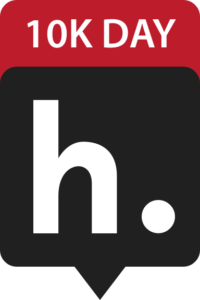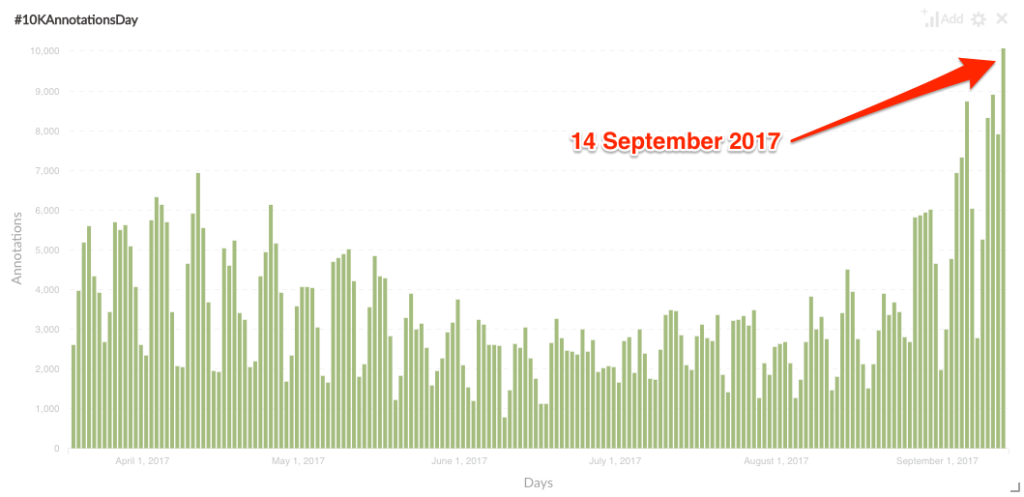10K Annotations in a Single Day
 Yesterday, for the first time ever, Hypothesis users created over 10,000 annotations in a single day, as our growth in annotations continued to accelerate.
Yesterday, for the first time ever, Hypothesis users created over 10,000 annotations in a single day, as our growth in annotations continued to accelerate.
When we announced the millionth annotation this February, we anticipated a 10,000-annotation day this year, but didn’t expect it so soon. On Thursday, 14 September, 1,260 different people created 10,126 annotations on 986 unique documents — the most annotations we’ve ever seen in one day. With the start of the academic school year, already seven of the top ten all-time days for annotation have happened in just these first two weeks of September, demonstrating the continuing dramatic growth of Hypothesis annotations and annotators, especially in education, but also in research, journalism and publishing. With almost 1,800,000 total annotations so far, we could see our 2-millionth annotation as early as October.
We reached this milestone in a week already full of fantastic news. We just announced new annotation adoptions with AGU, bioRxiv and MIT Press, participated in Peer Review Week 2017 with our post about making peer review more transparent with open annotation, and announced the Annotating All Knowledge Coalition’s free workshop on using annotation to ensure scholarly objects are FAIR: Findable, Accessible, Interoperable and Reusable.
It’s going to be a busy Fall. We’ve got a lot more exciting news anticipated for a wide range of things in progress now.
Also, our Hypothesis team members will be attending and/or speaking at these events all over the world and would love to meet with you to talk about using open annotation at your organization.
- COASP: 20-21 Sep, Lisbon, Portugal
- HighWire Fall Meeting: 26-28 Sep, Washington, DC, USA
- Digital Media & Learning Conference: 4-6, Oct, University of California, Irvine, USA
- STM: 10 Oct, Frankfurt, Germany
- OpenEd: 11-13 Oct, Anaheim, CA, USA
- Frankfurt Book Fair: 11-15 Oct, Frankfurt, Germany
- AAK Workshop on Annotation and FAIR: 24 Oct, Berlin, Germany
- FORCE2017: 25-27 Oct, Berlin, Germany
- EDUCAUSE: 31 Oct-3 Nov, Philadelphia, PA, USA
- Charleston Library Conference: 6-10 Nov, Charleston, SC, USA
- American Studies Association: 9-12 Nov, Chicago, Illinois, USA
Thank you
We’d like to thank everyone annotating — who show us every day that open, standards-based annotation is a worthy, useful tool — and the people at Hypothesis and across our wider community that have been building the technologies, standards, and practices to support our ambitious mission. Thank you for everything you’re doing to make annotation happen!
If you’re not annotating already, join in to make public or private annotations by yourself or collaborating with a group — it’s easy to get started.
